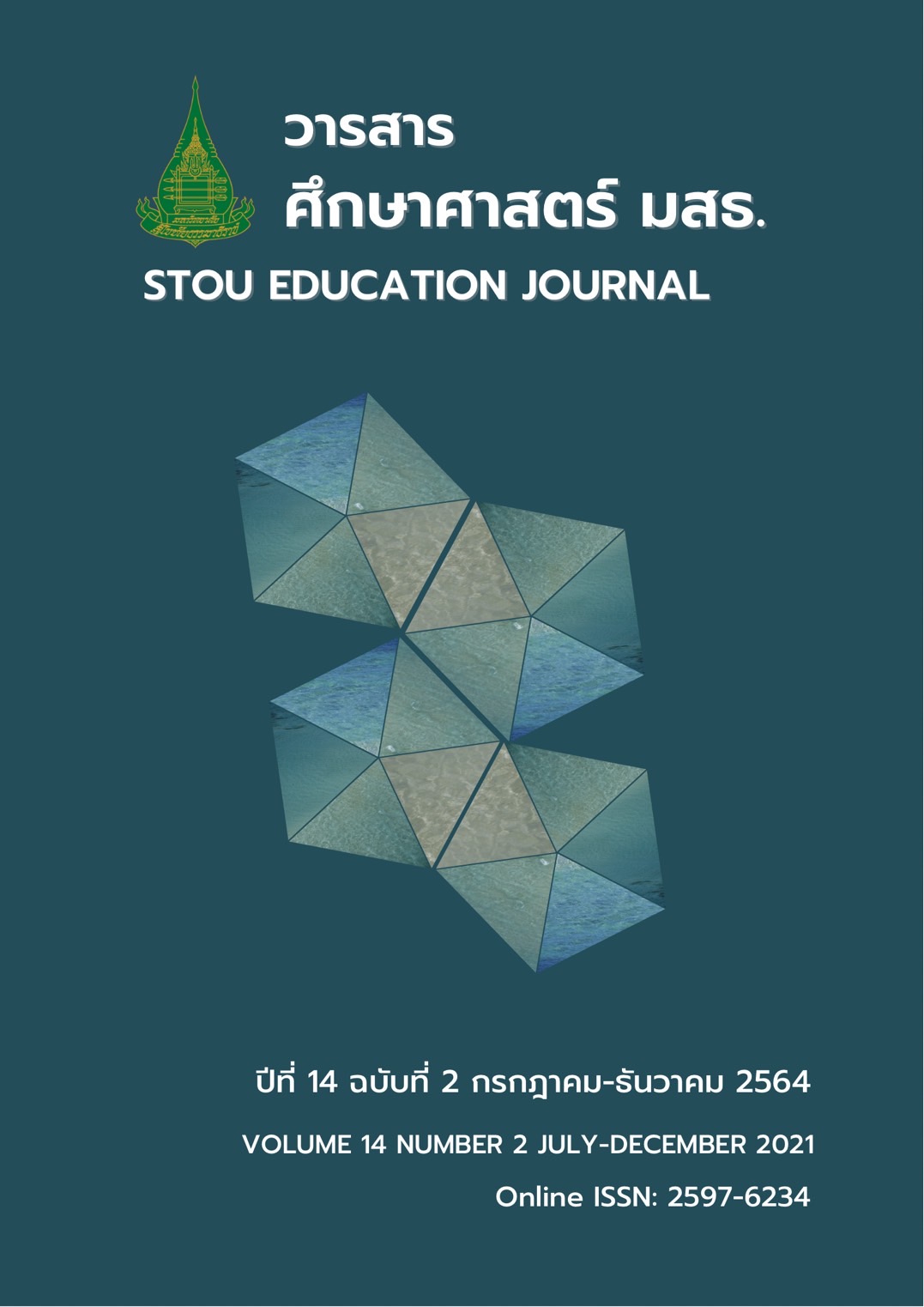การพัฒนารูปแบบการจัดกิจกรรมเพื่อเสริมสร้างพฤติกรรมคุณธรรมจริยธรรมสำหรับนักศึกษาคณะครุศาสตร์ มหาวิทยาลัยราชภัฏธนบุรี
Main Article Content
บทคัดย่อ
การวิจัยครั้งนี้มีวัตถุประสงค์เพื่อ 1) พัฒนารูปแบบการจัดกิจกรรมเพื่อเสริมสร้างพฤติกรรมคุณธรรมจริยธรรมด้านความมีวินัยและด้านความรับผิดชอบสำหรับนักศึกษาคณะครุศาสตร์ มหาวิทยาลัย ราชภัฏธนบุรี 2) ศึกษาประสิทธิภาพของรูปแบบการจัดกิจกรรม และ 3) เปรียบเทียบประสิทธิผลของรูปแบบการจัดกิจกรรมก่อนเรียนและ หลังเรียน การดำเนินการวิจัยแบ่งเป็น 4 ขั้นตอน ดังนี้ 1) ศึกษาข้อมูล แนวคิด ทฤษฎีจากเอกสารและงานวิจัยมาใช้สังเคราะห์เป็นโครงสร้างรูปแบบการจัดกิจกรรม 2) พัฒนารูปแบบการจัดกิจกรรมโดยผ่านการตรวจสอบความเหมาะสมจากผู้เชี่ยวชาญและการหาประสิทธิภาพ 3) นำรูปแบบการจัดกิจกรรมไปใช้ และ 4) ประเมินประสิทธิผลของรูปแบบการจัดกิจกรรม กลุ่มตัวอย่าง คือ นักศึกษาชั้นปีที่ 4 ที่ลงทะเบียนเรียนรายวิชา การวิจัยเพื่อพัฒนาการเรียนรู้ (1044103) ภาคเรียนที่ 2/2562 จำนวน 1 ห้องเรียน รวม 23 คน ได้มาโดยการสุ่มแบบกลุ่ม เวลาในการทดลอง 40 ชั่วโมง วิเคราะห์ข้อมูลด้วยสถิติ ค่าเฉลี่ย ส่วนเบี่ยงเบนมาตรฐานและการทดสอบค่าที ผลการวิจัยสรุปได้ดังนี้ 1) รูปแบบการจัดกิจกรรมประกอบด้วย 4 องค์ประกอบ ได้แก่ หลักการ วัตถุประสงค์ ขั้นการจัดกิจกรรมและการวัดและการประเมินผล 2) ผลการประเมินประสิทธิภาพของรูปแบบการจัดกิจกรรมพบว่า มีค่า E1/ E2 เท่ากับ 82.48/ 84.89 และ 3) ผลการเปรียบเทียบประสิทธิผลของรูปแบบการจัดกิจกรรม พบว่า (1) นักศึกษามีคะแนนเฉลี่ยความรู้ เจตคติทางคุณธรรมจริยธรรม เหตุผลเชิงคุณธรรมจริยธรรม และพฤติกรรมทางคุณธรรมจริยธรรม ด้านความมีวินัยและความรับผิดชอบ หลังการจัดกิจกรรมสูงกว่าก่อนการจัดกิจกรรมอย่างมีนัยสำคัญทางสถิติที่ระดับ .05 (2) นักศึกษามีความพึงพอใจต่อรูปแบบการจัดกิจกรรมอยู่ในระดับมาก
Article Details
เอกสารอ้างอิง
กระทรวงศึกษาธิการ. (2545). พระราชบัญญัติการศึกษาแห่งชาติ พุทธศักราช 2542 (ฉบับที่ 2) และที่แก้ไขเพิ่มเติม พุทธศักราช 2545. กรุงเทพฯ: บริษัทสยามสปอรต์ ซินดิเค จำกัด.
เกรียงศักดิ์ เจริญวงศ์ศักดิ์. (2541). ที่ทางแยก: จุดประกายวิสัยทัศน์อุดมศึกษาไทยในอนาคต. กรุงเทพมหานคร: ซัคเซสมีเดีย.
ฐาปนีย์ พสิษฐ์เนาวกุล และ พรสวรรค์ สุวัณณศรีย์. (2551). การศึกษารูปแบบการพัฒนาคุณธรรมจริยธรรม นักศึกษามหาวิทยาลัยราชภัฏเลย. มหาวิทยาลัยราชภัฏเลย, เลย.
ทิศนา แขมมณี. (2551). ศาสตร์การสอน : องค์ความรู้เพื่อการจัดกระบวนการเรียนรู้ที่มีประสิทธิภาพ (พิมพ์ครั้งที่ 7). กรุงเทพฯ: ด่านสุทธาการพิมพ์.
ทิศนา แขมมณี. (2546). การพัฒนาคุณธรรมจริยธรรมและค่านิยม: จากทฤษฎีสู่การปฏิบัติ. กรุงเทพมหานคร: เสริมสินพรีเพรส ซิสเท็ม.
นงเยาว์ อุทุมพร. (2560). เอกสารประกอบการสอนรายวิชาวัดและประเมินผลการเรียนรู้. คณะครุศาสตร์ มหาวิทยาลัยราชภัฏธนบุรี. กรุงเทพมหานคร.
พรรณี ช. เจนจิต. (2550). จิตวิทยาการเรียนการสอน. กรุงเทพมหานคร: ศูนย์ส่งเสริมวิชาการ.
พิมพันธ์ เดชะคุปต์. (2561). การเรียนรู้เชิงรุกแบบรวมพลังกับ PLC เพื่อการพัฒนา. กรุงเทพมหานคร:โรงพิมพ์ แห่งจุฬาลงกรณ์มหาวิทยาลัย.
สิริวรรณ ฉันทนะสานนท์. (2541). ผลของกิจกรรมกลุ่มที่มีต่อการใช้เหตุผลเชิงจริยธรรมด้านความเอื้อเฟื้อของนักเรียนชั้นประถมศึกษาปีที่ 6 โรงเรียนอัสสัมชัญคอนแวนต์สีลม กรุงเทพมหานคร. (วิทยานิพนธ์ ปริญญาการศึกษามหาบัณฑิต ไม่ได้ตีพิมพ์). มหาวิทยาลัยศรีนครินทรวิโรฒ, กรุงเทพมหานคร.
สุภาภรณ์ แก่นทอง. (2545). การจัดกระบวนการเรียนรู้ที่เน้นผู้เรียนเป็นสำคัญ การสอนแบบ “ร่วมกันสร้างความรู้และเรียนรู้อย่างมีความสุข”. กรุงเทพมหานคร: กองทุนรางวัลเกียรติยศแห่งวิชาชีพครู (กรค.) สำนักงานคณะกรรมการการศึกษาแห่งชาติ.
สุวิทย์ สุขหมั่น. (2546). ผลของการใช้กระบวนการกลุ่ม เพื่อพัฒนาพฤติกรรมจริยธรรมของนักเรียนชั้นประถมศึกษาปีที่ 3 โรงเรียนพัฒนาเด็ก สังกัดสำนักงานคณะกรรมการการศึกษาเอกชน จังหวัดขอนแก่น. (วิทยานิพนธ์ปริญญาศึกษาศาสตรมหาบัณฑิต ไม่ได้ตีพิมพ์). มหาวิทยาลัยขอนแก่น, ขอนแก่น.
สำนักงานเลขาธิการวุฒิสภา. (2560). รัฐธรรมนูญแห่งราชอาณาจักรไทย พุทธศักราช 2560. กรุงเทพฯ: สำนักงานเลขาธิการวุฒิสภา.
Bandura, A. (1977a). Social learning theory. Englewood Cliffs, NJ: Prentice-Hall.
Bandura, A. (1989). Social cognitive theory. In R. Vasta (Ed.), Annals of child development. Vol. 6. Six theories of child development. pp. 1-60. Greenwich, CT: JAI Press.
Eisenkraft, A. (2003). Expanding the 5E Model. Science Education, 5(6), .57-59.
Joyce B., & Weil M. (1996). Model of teaching (5th ed). Boston: Allyn and Bacon.
Kohlberg, L. (1976). Moral stages and moralization: The cognitive development approach, In Moral Development and Behavior: Theory, Research and Social. Lickana, T. (ed.) New York: Holt Rinehart and Winston.


